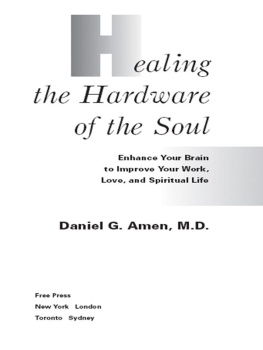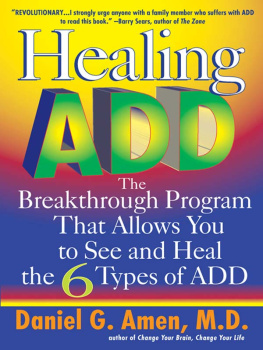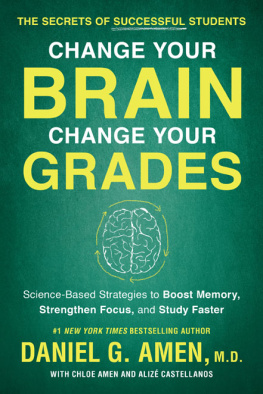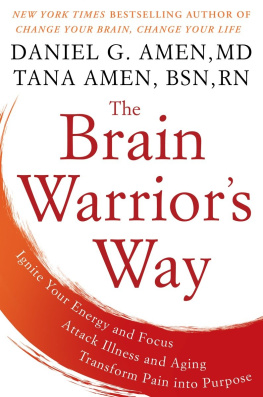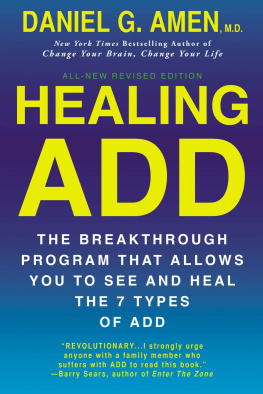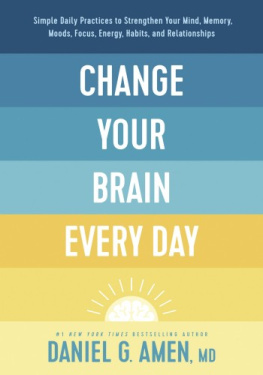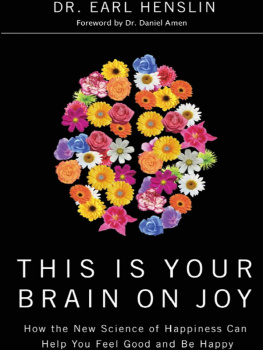Other Books by Daniel G. Amen, M.D.
Healing Anxiety and Depression (with Dr. Lisa Routh)
Preventing Alzheimers Disease (with Dr. Rod Shankle)
About the Author
D ANIEL G. A MEN , M.D. is a clinical neuroscientist, psychiatrist, author, and CEO and medical director of Amen Clinics, Inc., in Newport Beach and Fairfield, California; Tacoma, Washington; and Reston, Virginia. He is a Distinguished Fellow of the American Psychiatric Association and Assistant Clinical Professor of Psychiatry and Human Behavior at the University of California, Irvine School of Medicine. Dr. Amen lectures to thousands of mental health professionals, judges, and lay audiences each year. His clinics have the worlds largest database of brain images related to behavior.
Dr. Amen did his psychiatric training at the Walter Reed Army Medical Center in Washington, D.C. He has won writing and research awards from the American Psychiatric Association, the U.S. Army, and the Baltimore-D.C. Institute for Psychoanalysis. Dr. Amen has been published around the world. He is the author of numerous professional and popular articles, twenty-two books, and a number of audio and video programs. His books have been translated into fourteen languages and include Change Your Brain, Change Your Life, a New York Times bestseller; Healing ADD; Healing Anxiety and Depression (with Dr. Lisa Routh); Preventing Alzheimers Disease (with Dr. Rod Shankle); and Making a Good Brain Great, which was chosen as one of the best books of 2005 by Amazon.com and also won the prestigious Earphones Award for the audiobook. In addition, Dr. Amen has appeared on the Today Show, Good Morning America, The View, The Early Show, CNN, HBO, and many other national media. In 2008, his wrote and produced the PBS special Change Your Brain, Change Your Life .
Ten Ways to Exercise Your Brain
Your brain is like a muscle. The more you use it, the more you can use it. New learning causes new connections in the brain. No learning causes the brain to start disconnecting itself. No matter what your age, mental exercise has a global, positive effect on brain function. Here are ten tips to improve your brain and your life.
- Dedicate yourself to learning. Set aside fifteen minutes in your day to learn something new. Einstein said that if anyone were to spend fifteen minutes a day learning something new, in a year he or she would have become an expert. As in school or business, commitment is critical to achieving greatness and great brains.
- Take a class in something new and interesting. In many areas of the country, community colleges or learning groups offer low-cost classes in a wide variety of subjects. Attend a class in a subject totally unrelated to your day-today life. It is important to challenge your brain to learn new and novel things, especially processes that youve never done before. Examples include square-dancing (great exercise), chess, tai chi, yoga, and sculpture. Working with modeling clay or play dough can help children and adults grow new neuronal connections, develop agility, and improve hand-brain coordination.
- Cross-train at work. Learn someone elses job. Maybe even switch jobs for several weeks. This benefits the business and the employees alike, as both workers involved will have new skills and better brain function. For example, in a grocery store, employees can be taught to work as checkout clerks, stock shelves, order products, and alternately work in the produce, grocery, and dairy sections.
- Improve your skill at things you already do. Some repetitive mental stimulation is okay, as long as you look to expand your skills and knowledge base. Such common activities as gardening, sewing, playing bridge, reading, painting, and doing crossword puzzles have value, but push yourself to do different gardening techniques, follow more complex sewing patterns, play bridge against more talented players to increase your skill, read new authors on varied subjects, learn a new painting technique, and work more difficult crossword puzzles. Pushing your brain helps keep it healthy.
- Limit television viewing for kids and adults. A study published in the journal Pediatrics reported that, for every hour a day children watch TV, there is a 10 percent increase in the chance of their being diagnosed with attention deficit disorder (ADD). This means a child who watches five hours a day has a 50 percent increase in the chance of being diagnosed with ADD. According to the American Academy of Child and Adolescent Psychiatry, most children spend three to four hours a day watching TV. In several other studies, television watching in children put them at risk for problems as adults that also affect brain health. Dr. R. J. Hancox and colleagues from the Department of Preventive and Social Medicine, Dunedin School of Medicine at the University of Otago, New Zealand, assessed approximately a thousand children born in 1972-1973 at regular intervals up to age twenty-six. They found a significant association between higher body-mass indices, lower physical fitness, increased cigarette smoking, raised serum cholesterol, and the amount of time spent watching television. These are all factors involved in such brain illnesses as strokes or Alzheimers disease. In yet another study, adults who watched two or more hours a day of TV had a significantly higher risk of developing Alzheimers disease. Watching TV usually involves little brain activity. To be fair, these studies did not specify if watching educational programs had the same effect as watching situation comedies or sports, but I suspect that no-brain TV shows are the problem.
- Limit video games. As the father of four children and a child psychiatrist, I have thought a lot about video games over the past eighteen years. At first I found them great fun to play. Then I started to worry. Action video games have been studied using brain-imaging techniques that look at blood flow and activity patterns. Video games have been found to work in an area of the brain called the basal ganglia, one of the pleasure centers in the brain. In fact, this is the same part of the brain that shows increased activity when we inject a person with cocaine. My experience with patients and one of my own children is that they tend to get hooked on the games and play so much that it can detract from their school work, work, and social time, similar to a drug addiction. Some children and adults really get hooked on these games.

